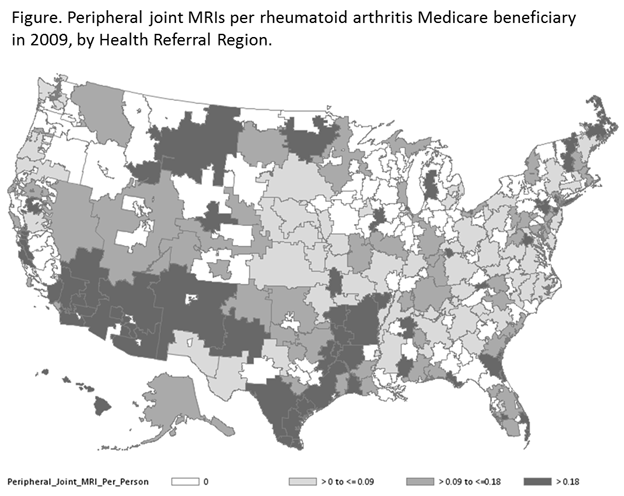Session Information
Session Type: ACR Poster Session C
Session Time: 9:00AM-11:00AM
Background/Purpose: The Choosing Wisely campaign,
which commenced in 2011, focuses on reducing medical services that are of
questionable value or may be harmful. In 2013, the American College of
Rheumatology published their own “Top 5” list, which included the recommendation
to avoid MRI of the peripheral joints to monitor patients with inflammatory
arthritis. We sought to determine the prevalence of MRI of the peripheral
joints among patients with inflammatory arthritis before the “Top 5” lists were
published to estimate the potential effect of the recommendations on future use
of resources.
Methods: We examined use of peripheral joint MRI
using data from a nationally representative 5% sample of Medicare
fee-for-service claims. Using ICD9 codes we identified patients 65 years or older
with at least 2 face-to-face claims for rheumatoid arthritis (714.xx) between
Jan 1 and Dec 31, 2009. We used CPT codes to classify patients as having
undergone MRI or plain film radiography of the peripheral joints. To assess
regional variation, we estimated peripheral joint MRI use per patient by
hospital referral region (HRR). We used linear regression to correlate the
number of peripheral joint MRI performed in each HRR with the number of
physicians or rheumatologists per Medicare beneficiary (supply data from the
Dartmouth Atlas).
Results: We included 8,052 patients in our analysis.
81% were women and mean age was 76 years. 7.7% of patients underwent at least
1 peripheral joint MRI compared with 38.6% for peripheral joint plain films.
Peripheral joint MRI use varied widely across 304 HRRs (range 0-2.25 per patient;
interquartile range 0-0.15). High utilization areas were clustered in the
southern and southwestern U.S. (see Figure). Linear regression revealed a
non-significant relationship between peripheral joint MRI and HRR supply of
physicians (p=0.07) or HRR supply of rheumatologists (p=0.86).
Conclusion: Before the start of the Choosing Wisely
campaign, use of peripheral joint MRI for Medicare patients with known or
suspected inflammatory arthritis varied widely across geographic regions. Although
we cannot judge the appropriateness of each radiographic test performed, marked
variation in utilization suggests that studies to assess overuse are warranted.
Future analyses should also assess the impact of the Choosing Wisely campaign
in reducing the variation in use of peripheral joint MRI.
To cite this abstract in AMA style:
Schmajuk G, Tonner C, Murray SG, Yazdany J. Peripheral Joint MRI for Inflammatory Arthritis and the Choosing Wisely Campaign – Evidence for Wide Variations in Use [abstract]. Arthritis Rheumatol. 2015; 67 (suppl 10). https://acrabstracts.org/abstract/peripheral-joint-mri-for-inflammatory-arthritis-and-the-choosing-wisely-campaign-evidence-for-wide-variations-in-use/. Accessed .« Back to 2015 ACR/ARHP Annual Meeting
ACR Meeting Abstracts - https://acrabstracts.org/abstract/peripheral-joint-mri-for-inflammatory-arthritis-and-the-choosing-wisely-campaign-evidence-for-wide-variations-in-use/

